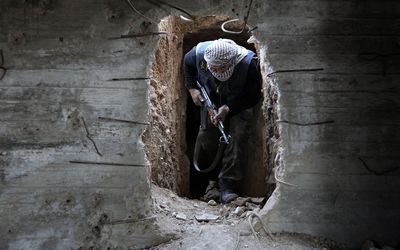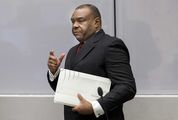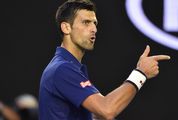DAMASCUS — Central players in Syria’s war traded accusations on Sunday over violations of the first major ceasefire in the five-year conflict, but the truce remained largely intact on its second day.
Aid groups hope to use the lull in fighting that has claimed 270,000 lives and displaced more than half the population to deliver desperately needed supplies.
A successful truce would also create a more favourable backdrop for peace talks that collapsed in acrimony in early February as a Russia-backed regime offensive in northern Syria caused tens of thousands to flee.
The main opposition grouping on Sunday described the ceasefire as "positive" but lodged a formal complaint with the United Nations (UN) and foreign governments about breaches on the first day.
"We have violations here and there, but in general it is a lot better than before and people are comfortable," said Salem al-Meslet, spokesman for the Saudi-backed High Negotiations Committee.
An HNC letter to UN Secretary-General Ban Ki-moon accused the Syrian government and its allies of committing "24 violations with artillery shelling and five ground operations … in 26 areas held by the moderate opposition".
The letter, signed by HNC head Riad Hijab, also attacked Russia for conducting "26 air strikes on areas falling within the ceasefire".
Mr Hijab said the breaches had killed 29 people and wounded dozens.
The HNC has said it did not receive any maps outlining which areas were included in the ceasefire or documents explaining the monitoring mechanism.
Syria’s Al-Watan daily, which is close to the government, said on Sunday that those maps were still being "kept secret".
The ceasefire does not apply to territory held by the Islamic State (IS) and Al-Nusra Front jihadist groups.
Saudi Arabia, a staunch opponent of Syrian President Bashar al-Assad, also accused Russia of flouting the ceasefire and targeting "moderate opposition" groups.
"Things will become clearer in the coming days on whether the regime and Russia are serious or not about the ceasefire," Saudi Foreign Minister Adel Jubeir said.
Russia, which has waged a five-month bombing campaign to support Assad, blamed "moderate" rebels, Turkey and jihadists for nine ceasefire violations.
But "on the whole, the ceasefire regime in Syria is being implemented", Lt-Gen Sergei Kuralenko, head of Moscow’s co-ordination centre in Syria, was quoted as saying by Russian news agencies.
Witnesses in Damascus and Aleppo reported less shelling.
"There’s something strange in this silence. We used to go to sleep and wake up with the sound of raids and artillery," said Abu Omar, who runs a bakery in rebel-held east Aleppo.
Britain-based monitor the Syrian Observatory for Human Rights reported air strikes — believed to be either Syrian or Russian — on seven villages in Hama and Aleppo provinces.
It was unclear if the raids hit areas covered by the ceasefire, which excludes territory held by IS and Al-Nusra.
According to Observatory head Rami Abdel Rahman, only one of the villages, Kafr Hamra in Aleppo province, is controlled by Al-Nusra and the others are held by non-jihadist rebels.
As recriminations flew, Washington urged everyone to be patient.
"Setbacks are inevitable," a senior US administration official said. "Even under the best of circumstances, we don’t expect the violence to end immediately. In fact, we are certain that there will continue to be fighting, in part because of organisations like ISIL and Al-Nusra."
A task force set up to monitor the deal described Saturday’s first day as largely successful.
"The UN, the US and Russia have made a positive assessment of the first hours of the cessation of hostilities," a Western diplomat said after the International Syria Support Group met in Geneva.
The UN reported "some incidents" in apparent violation of the truce, but "they have been defused", he said.
UN envoy Staffan de Mistura aims to relaunch peace talks on March 7 if the ceasefire lasts and more aid is delivered.
Israel, arch-foe of Mr Assad’s other key backer Tehran, welcomed the ceasefire but warned it would not accept Iranian "aggression" or the supply of advanced weapons to Hezbollah, the Lebanese Shiite militia supporting the regime.
"It’s important it remains clear any agreement in Syria must include an end to Iranian aggression aimed at Israel from Syria’s territory," Prime Minister Benjamin Netanyahu said on Sunday.
AFP

A Syrian rebel fighter from the Islamist Failaq al-Rahman brigade comes out of hiding on the frontline against regime forces in the town of Arbin on the outskirts of the capital, Damascus, on Friday. A partial ceasefire between Syria's regime forces and non-jihadist fighters took effect at midnight. Picture: AFP PHOTO/AMER ALMOHIBANY
DAMASCUS — Central players in Syria’s war traded accusations on Sunday over violations of the first major ceasefire in the five-year conflict, but the truce remained largely intact on its second day.
Aid groups hope to use the lull in fighting that has claimed 270,000 lives and displaced more than half the population to deliver desperately needed supplies.
A successful truce would also create a more favourable backdrop for peace talks that collapsed in acrimony in early February as a Russia-backed regime offensive in northern Syria caused tens of thousands to flee.
The main opposition grouping on Sunday described the ceasefire as "positive" but lodged a formal complaint with the United Nations (UN) and foreign governments about breaches on the first day.
"We have violations here and there, but in general it is a lot better than before and people are comfortable," said Salem al-Meslet, spokesman for the Saudi-backed High Negotiations Committee.
An HNC letter to UN Secretary-General Ban Ki-moon accused the Syrian government and its allies of committing "24 violations with artillery shelling and five ground operations … in 26 areas held by the moderate opposition".
The letter, signed by HNC head Riad Hijab, also attacked Russia for conducting "26 air strikes on areas falling within the ceasefire".
Mr Hijab said the breaches had killed 29 people and wounded dozens.
The HNC has said it did not receive any maps outlining which areas were included in the ceasefire or documents explaining the monitoring mechanism.
Syria’s Al-Watan daily, which is close to the government, said on Sunday that those maps were still being "kept secret".
The ceasefire does not apply to territory held by the Islamic State (IS) and Al-Nusra Front jihadist groups.
Saudi Arabia, a staunch opponent of Syrian President Bashar al-Assad, also accused Russia of flouting the ceasefire and targeting "moderate opposition" groups.
"Things will become clearer in the coming days on whether the regime and Russia are serious or not about the ceasefire," Saudi Foreign Minister Adel Jubeir said.
Russia, which has waged a five-month bombing campaign to support Assad, blamed "moderate" rebels, Turkey and jihadists for nine ceasefire violations.
But "on the whole, the ceasefire regime in Syria is being implemented", Lt-Gen Sergei Kuralenko, head of Moscow’s co-ordination centre in Syria, was quoted as saying by Russian news agencies.
Witnesses in Damascus and Aleppo reported less shelling.
"There’s something strange in this silence. We used to go to sleep and wake up with the sound of raids and artillery," said Abu Omar, who runs a bakery in rebel-held east Aleppo.
Britain-based monitor the Syrian Observatory for Human Rights reported air strikes — believed to be either Syrian or Russian — on seven villages in Hama and Aleppo provinces.
It was unclear if the raids hit areas covered by the ceasefire, which excludes territory held by IS and Al-Nusra.
According to Observatory head Rami Abdel Rahman, only one of the villages, Kafr Hamra in Aleppo province, is controlled by Al-Nusra and the others are held by non-jihadist rebels.
As recriminations flew, Washington urged everyone to be patient.
"Setbacks are inevitable," a senior US administration official said. "Even under the best of circumstances, we don’t expect the violence to end immediately. In fact, we are certain that there will continue to be fighting, in part because of organisations like ISIL and Al-Nusra."
A task force set up to monitor the deal described Saturday’s first day as largely successful.
"The UN, the US and Russia have made a positive assessment of the first hours of the cessation of hostilities," a Western diplomat said after the International Syria Support Group met in Geneva.
The UN reported "some incidents" in apparent violation of the truce, but "they have been defused", he said.
UN envoy Staffan de Mistura aims to relaunch peace talks on March 7 if the ceasefire lasts and more aid is delivered.
Israel, arch-foe of Mr Assad’s other key backer Tehran, welcomed the ceasefire but warned it would not accept Iranian "aggression" or the supply of advanced weapons to Hezbollah, the Lebanese Shiite militia supporting the regime.
"It’s important it remains clear any agreement in Syria must include an end to Iranian aggression aimed at Israel from Syria’s territory," Prime Minister Benjamin Netanyahu said on Sunday.
AFP




















Change: 1.19%
Change: 1.36%
Change: 2.19%
Change: 1.49%
Change: -0.77%
Data supplied by Profile Data
Change: -0.08%
Change: 0.12%
Change: 1.19%
Change: 0.00%
Change: 0.10%
Data supplied by Profile Data
Change: 0.32%
Change: 0.38%
Change: 0.36%
Change: 0.22%
Change: 0.23%
Data supplied by Profile Data
Change: -0.02%
Change: -0.51%
Change: -0.19%
Change: -0.33%
Change: -0.15%
Data supplied by Profile Data